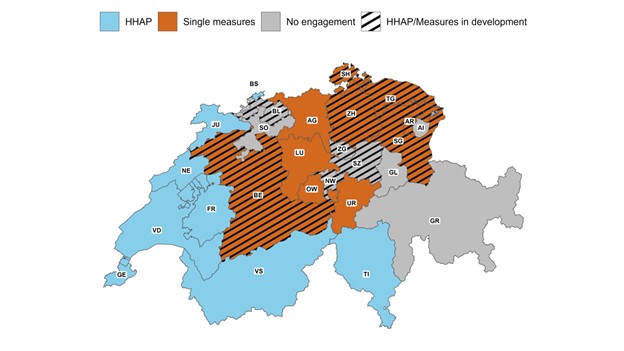The project - as part of the federal government's Adaptation to climate change action plan - provides an overview of the status of the implementation of adaptation measures in the health sector to the increasing heat stress.
2023 survey on the heat competence of the population aged 50 and over
In summer 2023, 1,800 people aged 50 and over were surveyed about their heat competence. This includes knowledge of possible protective measures in hot weather, how they are affected by the heat (perceived stress and health risk) and what they do in hot weather, in particular implementing behavioral recommendations.
Although almost all participants said they knew how to protect themselves in hot weather, many named only a few of the possible protective measures. The most frequently mentioned recommendations were “drink plenty of fluids” and “seek out cool places,” while other measures such as “avoid alcohol” and “adjust medication dosage” were rarely mentioned. Around half of those surveyed found the heat stressful and considered it a health risk. However, a third of the particularly vulnerable target group – people with chronic illnesses and those over 75 – underestimated the risk to their own health.
Despite their knowledge of the protective measures, many took few protective measures. Older men and socially disadvantaged groups in particular showed less heat protection behavior. This shows that knowledge alone is not enough to change behavior. Public education, especially for vulnerable groups, is therefore important. Traditional media, weather apps, and, in particular, the social environment are important sources of information. Health professionals also play a key role in this regard.
Read the full report in German with summaries in French and Italian here:
Report «Status of Implementation of Health-related Heat Protection Measures in Switzerland - Heat Literacy of the 50+ Population: Knowledge, Concern, Action in Summer 2023», Martucci et al. on behalf of the FOEN and FOPH, 2024 (in German, summary in French and Italian) (PDF, 1 MB, 12.05.2025)The full report in French is available on the French website.
2024 survey on heat health action plans and the efforts of health authorities
In summer 2024, the health authorities of all cantons, Liechtenstein, and five major Swiss cities were surveyed about their heat protection measures. The survey shows that more and more cantons are getting involved in heat protection: 18 out of 26 health authorities are already implementing measures, and eight cantons have introduced heat health action plans (HHAP) (as of 2024). Other cantons are planning to introduce HHAPs. All five cities surveyed have also taken measures to protect against heat.

Health authorities play a coordinating role by providing information and issuing timely warnings about heat waves. Most measures are aimed at risk groups such as older people. The most common measures include information campaigns about risks and recommendations on how to behave in hot weather. Success factors include committed individuals, political decisions, and a greater exposure to heat; obstacles often include a lack of financial and human resources.
Many German-speaking cantons would like to see more exchange, better coordination between cantons, and support from the federal government in introducing heat action plans, including in the areas of monitoring and evaluation.
Read the full report in German with summaries in English, French and Italian here:
Report «Status of Implementation of Health-related Protection Measures in Switzerland - Heat Health Action Plans and Efforts of Health Authorities in 2024», Ragettli et al. on behalf of the FOPH and FOEN, 2025 (in German, summary in English, French and Italian) (PDF, 2 MB, 13.05.2025)The full report in French is available on the French website.
Last modification 24.09.2025
Contact
Federal Office of Public Health FOPH
Healthcare and Related Professions Division
Healthcare Developement Section
Schwarzenburgstrasse 157
3003 Berne
Tel.: +41 58 463 30 11
gesundheitsstrategien@bag.admin.ch
www.bag.admin.ch





